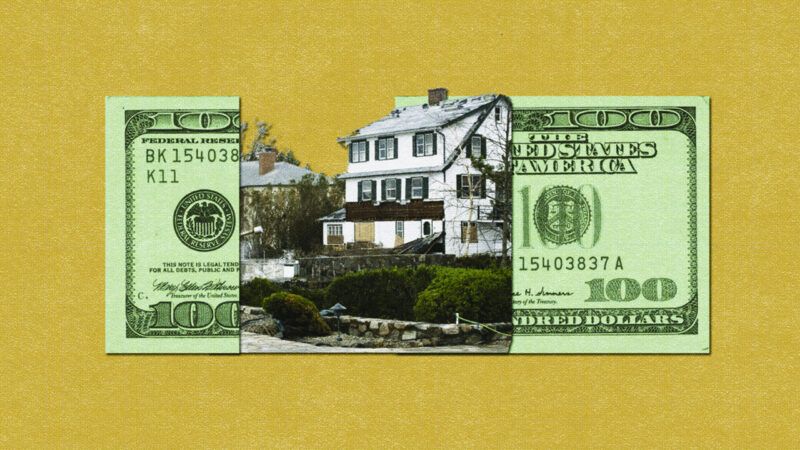Wealthy Connecticut Residents Received Millions in Federal Dollars After Hurricane Sandy
It shouldn't be the federal government's responsibility to protect wealthy homeowners from the inevitable.

After the devastation caused by Hurricane Sandy in 2012, Congress apportioned over $50 billion for disaster relief. Among that total was $16 billion for the U.S. Department of Housing and Urban Development (HUD)'s Community Development Block Grant Disaster Recovery program (CDBG-DR). The state of Connecticut received $159 million.
CDBG-DR is intended primarily to help people with lower incomes respond to disasters. But a new Politico investigation reveals that as low-income areas in Connecticut remained in disrepair after the storm, generous reimbursements and low-interest loans went to wealthy homeowners who, on paper, should not have even qualified.
In Bridgeport, which has a median household income of just over half the state average, 25 homeowners received $1.7 million toward home repairs, but the still-unrepaired damage to Bridgeport homes is estimated at over $1.1 million.
Meanwhile, in tony towns like Darien and Greenwich, Politico found 62 households that received five- and six-figure grants for repairs on homes worth $1 million or more. Those homeowners collectively received $6.2 million in aid, around 15 percent of the $44 million distributed for home repairs.
In some cases, homeowners made repairs with their own money and received the grants months later. Even if they did not have the cash on hand, they were not without means: Of the 62 households, half borrowed against their home equity to fund repairs, an option not available to renters or those who don't have considerable equity.
One Greenwich household got $100,000 by refinancing the mortgage, and a family member cashed in airline miles in order to put them up in a Hyatt Regency after the storm hit. But in addition to an insurance payout, that same family also borrowed $87,000 in disaster loans from the Small Business Administration and received $30,000 in disaster aid from the Federal Emergency Management Agency.
Then nearly two years after the repairs were completed, the family received $92,000 in disaster relief funds. Another homeowner told Politico that he received $150,000, the maximum, after repairs were completed on his $2.6 million home.
One of the Greenwich homeowners told Politico that although the family spent over $150,000 out-of-pocket to rebuild, the extra money allowed them to invest in upgrades and raise the home's value. In fact, of the 62 households, 21 have sold their homes since repairs were completed, for an average sale price of $1.77 million.
On one hand, generous benefit programs like the one detailed by Politico are ripe for abuse, and it's unfortunately no surprise that the wealthy and well-connected got a sizable chunk of the funds. But federal relief programs also promote poor incentives that exacerbate the harm from natural disasters.
The Politico article claims, "HUD disaster aid has become more vital as climate change intensifies storms, floods and wildfires." In fact, disaster aid programs actually incentivize people to live in unsafe areas. Since 1968, the National Flood Insurance Program (NFIP) has subsidized flood insurance in areas at higher risk for flooding, where the private insurance market would otherwise dare not go. As a result, more people moved to flood- and hurricane-prone areas as the cost of living is artificially lower than if the market were allowed to determine the proper level of risk.
The properties that the NFIP insures tend to be of higher value than the national average. Additionally, a significant number are not primary residences, implying second homes and vacation properties.
The Greenwich family quoted in Politico experienced a genuine hardship, but they also had the means to recover without federal aid. If wealthy homeowners want to live in places likely to experience severe weather events, they're free to do so, but it shouldn't be the federal government's responsibility to help protect them against the consequences.


Show Comments (20)